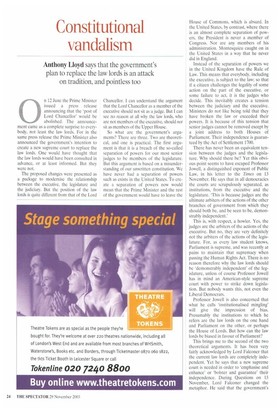Constitutional vandalism
Anthony Lloyd says that the government's plan to replace the law lords is an attack on tradition, and pointless too n 12 June the Prime Minister issued a press release announcing that the 'post of Lord Chancellor' would be abolished. The announce
ment came as a complete surprise to everybody, not least the law lords. For in the same press release the Prime Minister also announced the government's intention to create a new supreme court to replace the law lords. One would have thought that the law lords would have been consulted in advance, or at least informed. But they were not.
The proposed changes were presented as a package to modernise the relationship between the executive, the legislature and the judiciary. But the position of the law lords is quite different from that of the Lord Chancellor, I can understand the argument that the Lord Chancellor as a member of the executive should not sit as a judge. But I can see no reason at all why the law lords, who are not members of the executive, should not sit as members of the Upper House.
So what are the government's arguments? There are three. Two are theoretical, and one is practical. The first argument is that it is a breach of the so-called separation of powers for our most senior judges to be members of the legislature. But this argument is based on a misunderstanding of our unwritten constitution. We have never had a separation of powers such as exists in the United States. To create a separation of powers now would mean that the Prime Minister and the rest of the government would have to leave the House of Commons, which is absurd. In the United States, by contrast, where there is an almost complete separation of powers, the President is never a member of Congress. Nor are any members of his administration. Montesquieu caught on in the United States in a way that he never did in England.
Instead of the separation of powers we in the United Kingdom have the Rule of Law. This means that everybody, including the executive, is subject to the law; so that if a citizen challenges the legality of some action on the part of the executive, or some failure to act, it is the judges who decide. This inevitably creates a tension between the judiciary and the executive. Ministers do not like being told that they have broken the law or exceeded their powers. It is because of this tension that senior judges cannot be removed except by a joint address to both Houses of Parliament. Their independence is guaranteed by the Act of Settlement 1700.
There has never been an equivalent tension between the judges and the legislature. Why should there be? Yet this obvious point seems to have escaped Professor Jowell, a distinguished exponent of Public Law, in his letter to the Times on 13 November. He says that in all democracies the courts are scrupulously separated, as institutions, from the executive and the legislature. 'This is because judges are the ultimate arbiters of the actions of the other branches of government from which they should both be, and be seen to be, demonstrably independent.'
This is, with respect, a howler. Yes, the judges are the arbiters of the actions of the executive. But no, they are very definitely not the arbiters of the actions of the legislature. For, as every law student knows, Parliament is supreme, and was recently at pains to maintain that supremacy when passing the Human Rights Act. There is no reason therefore why the law lords should be 'demonstrably independent' of the legislature, unless of course Professor Jowell has in mind an American-style supreme court with power to strike down legislation. But nobody wants this, not even the Liberal Democrats.
Professor Iowa is also concerned that what he calls 'institutionalised mingling' will give the impression of bias. Presumably the institutions to which he refers are the law lords on the one hand and Parliament on the other, or perhaps the House of Lords. But how can the law lords be biased in favour of Parliament?
This brings me to the second of the two theoretical arguments. It has been very fairly acknowledged by Lord Falconer that the current law lords are completely independent. Yet he says that a new supreme court is needed in order to 'emphasise and enhance' or 'bolster and guarantee' their independence. During Questions on 13 November, Lord Falconer changed the metaphor. He said that the government's aim is to 'embed and strengthen' judicial independence. But later the same day he seemed to accept that judicial independence is already 'embedded in our constitution'. In the latter respect he is, of course, quite right. But how is the independence of the law lords to be further embedded, strengthened, bolstered, guaranteed. emphasised or enhanced by moving them out of the Palace of Westminster into some other building, and calling them something different? If they are already completely independent (as is acknowledged), how can their independence be enlarged?
Then it is said, Ah, but it is the appearance that matters. We must do what we can to 'minimise the danger that judges could be perceived to be politically motivated'. So the law lords must 'come out from under the shadow of the legislature'. It is hard to take these observations seriously. Almost everybody in the land must surely now be aware of the Hutton inquiry. Almost everybody must be aware that Lord Hutton is a law lord. Does anybody suppose that his report will be politically motivated? If not, why should anybody suppose that his judgments are politically motivated? The public 'perception' on which the whole argument is founded is illusory.
So the argument based on the need to bolster the independence of the law lords is as fallacious as the doctrinal argument based on the separation of powers. Indeed the irony is that at the moment the only potential threat to the independence of the judiciary comes from the government itself, if it were to carry out its proposal to abolish the office of Lord Chancellor. I turn last to the practical arguments. It is said that the presence of the law lords in the House of Lords 'limits the resources that can be made available to them'. In other words, the law lords are not costing enough. This is an odd argument to find in the mouth of any government. By way of illustration, it is said that one of the law lords does not even have his own room. What is not said is that the law lord in question is Lord Saville, who, as is well known, has been otherwise occupied for the last five years.
The truth is that the law lords are astonishingly good value for money. Currently, the net cost of maintaining the law lords, excluding their own salaries but including the salaries of all staff, is under £200,000 a year. In other words, the law lords are all but self-financing. In comparison, the cost of a move to another building would be huge, and the expense would be continuing. Many of the common services now provided on the House of Lords vote would have to be duplicated. Yet none of this expenditure would improve the quality of decision-making one jot, nor increase the respect in which the law lords are held throughout the common-law world. The argument that the law lords deserve a grand new building rings almost as hollow as the other arguments.
In due course we will perhaps be given some costings. There are none at the moment. Originally the idea was that the law lords might move into part of Somerset House, but that has apparently fallen through. Then there was a rumour that the government would pay for a brand-new building, adorned with coats of arms and Corinthian columns. But where? And at what cost? The latest rumour is that the new court will be accommodated — guess where — in the House of Lords. But the members of the court will not be peers. Will they, one wonders, be allowed into the library? Or the peers' diningroom? Or the peers' lavatory? Or will they have to lead separate, cloistered lives, in order to avoid 'institutionalised mingling'?
One is left to wonder how the government has been led along this absurd path. Could it be, as was suggested in September by Lord Kingsland, the shadow Lord Chancellor, that the government do not like the judges, and are looking for ways to weaken their role in our constitutional arrangements? Or could it be that they are following meekly behind the Parliamentary Assembly of the Council of Europe, which in April criticised the Lord Chancellor for exercising both judicial and executive functions and went on to recommend the creation of a supreme court whose members would not be members of the Upper House? If it is the latter, then it looks as though the legal affairs and human rights committee of the Assembly may, to my regret, have succeeded where Montesquieu so signally failed.
Lord Lloyd of Berwick is a retired law lord.



























































































 Previous page
Previous page